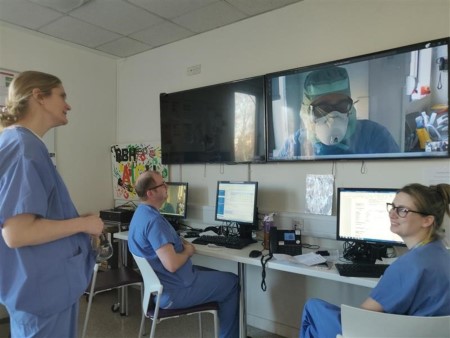A new virtual communication system has been set up in just fourteen days to give frontline teams treating patients with coronavirus at Royal Brompton and Harefield hospitals, round-the-clock remote access to specialist colleagues at the Trust. The system will also enable some family members of critically ill patients to see and speak to their loved ones. 
The simple set up uses a high-resolution webcam that is attached to a computer at a patient’s bedside in intensive care, enabling frontline clinicians delivering critical care, on-demand access to virtual support from consultants any time they need it. This helps senior clinicians provide constant remote support to all the critical care areas under isolation – the so-called red zones – helping facilitate team communication, save time and reducing the need to use Personal Protective Equipment.
The new webcam system is also being used to enable families to see their loved ones on the intensive care unit (ICU), when they are unable to enter the critical care environment due to infection risks.
For the wife of one patient, the webcam was an opportunity to comfort and connect with her husband by singing to him, alongside their two children. For another family, it allowed them to spend an hour speaking to their loved one at his bedside to support his recovery.
Speaking about the effect the webcam system is having on patients and families, Laura Rowlands, senior staff nurse on Harefield Hospital’s Intensive Therapy Unit (ITU), said: “It’s such a worrying and anxious time for families who have a loved one in critical care, compounded by the fact that they’re not able to visit them, but the webcams have made such a positive difference in helping bridge this distance.
"What started as a way of helping staff communicate with each other, has evolved into a way of letting families onto the ward as if they were physically there. A huge part of my role is to look after the family as I would their loved one in my care, so seeing what this has meant to them and for their morale – whether it be patients speaking to their husband or wife for the first time since entering the ITU, or a whole family getting together on a smartphone to dial in to the virtual system – has been incredibly uplifting.”
 Dr Louit Thakuria, consultant in adult intensive care, said: “As capacity for critically ill patients with coronavirus has expanded at the Trust, new ways of working have been introduced to serve patient and family needs that are quick to set up, adopt and expand. This simple yet innovative solution will keep critically ill patients who may be nearing the end of their life, connected to their loved ones at a time they need them most.”
Dr Louit Thakuria, consultant in adult intensive care, said: “As capacity for critically ill patients with coronavirus has expanded at the Trust, new ways of working have been introduced to serve patient and family needs that are quick to set up, adopt and expand. This simple yet innovative solution will keep critically ill patients who may be nearing the end of their life, connected to their loved ones at a time they need them most.”
The system has been a positive force for one patient’s family: “My mother, sister and I have taken tremendous comfort from the video calls that the ITU team at Harefield Hospital have been able to arrange with my father. This incredible system has allowed us to see Dad, to tell him how much he is loved and means to each of us, and to encourage him to remain strong and recover.
"We have also been able to see and talk to some of the incredible doctors and nurses that have been so attentive, dedicated and professional. The system has even allowed them to monitor Dad’s responsiveness to our voices while they are reducing his sedation and slowly waking him up. When all we want to do is be by Dad’s bedside and will him on to a full recovery, the system has given us the opportunity to be a little closer to him. It’s an amazing tool that we hope will spread across the NHS.”
The project harnessed the power of social media to combat the difficulty of sourcing webcams that have seen a recent surge in demand.
Dr Thakuria explained: “Integral to the time-critical set up of this project has been the response from the social community. Following a call out on social media for key pieces of hardware, we were able to amass over 100 webcams that were generously donated from various organisations – over half of these came from the University of Reading.
“Following a brief pilot in a live setting, the system has been fully implemented on Royal Brompton and Harefield Hospitals’ ICUs, and there are plans to roll it out to other critical care wards across both our hospitals, if needed.”
